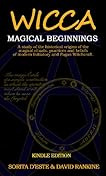 Wicca Magical Beginnings : A study of the historical origins of the magical rituals, practices and beliefs of modern Pagan Witchcraft. by Sorita D'este
Wicca Magical Beginnings : A study of the historical origins of the magical rituals, practices and beliefs of modern Pagan Witchcraft. by Sorita D'esteMy rating: 5 of 5 stars
Do you want to get down to the roots of Wicca and understand the magic behind behind the religion that Gerald Gardner introduced/ invented in the early 1950's. If the answer is yes then this awesome over view is for you. Since the emergence of what is what is called "Wicca" in the 1950's there has been much controversy as to whether Gerald Gardner invented this religion or was initiated into it. The book covers the magical history of all the practices contained in Wicca, offering a different approach then Ronald Hutton who gives over a straight history of development.
Practice by practice the author's Sorita d'Este and David Rankine give the most recent history of each idea and then go back to it's most ancient historical practice. Starting with the emergence of Wicca the authors state the controversy of Wicca's beginning and then give you there hypothesis which sound rather agreeable. Gerald Gardner was initiated into a coven that practiced witch craft but when he released it to the public he added a whole bunch of stuff. Most of the material he added into his religion derived from the works of Aleister Crowley, Charles Leland,Key of Solomon and Frazier's Golden Bough. While many practices and chants were derived from these Ceremonial Magic sources.They also had antecedent many stretching back to Ancient Egypt and Babylonia.
The religion of Wicca may seem dubious for a variety of reasons. One is that Gerald Gardner himself made many false statements. The reasoning behind these false statements could be that Gerald Gardner was being unethical in trying to promote Witchcraft or was he merely protecting oath bound material.
What is the meaning behind Wicca? When was it used by Gardner? In fact he himself may never have used Wicca as a name for his religion, especially in his earlier works. The word Wicca goes back many centuries and the term "Wica" actually did mean witch or one who could bend reality. The meaning though was not positive as many societies even one that predated Christianity like the Norse and the Greeks had negative views of witches. Wiches were workers of evil. Something which Wiccans were not. big questions as to why he used the term witchcraft which carried such a negative connotation. If they had used a different term might Wicca have been more positively viewed. The practices of Wicca are more closely aligned to the practitioners in the Ancient Temple then they were to witches.
Charles Leland's book on Aradia was thought by many to be dubious and non scholarly. However, written works going back to the 14-15th century tell of witches dancing naked under the moon worshiping Diana at the shores of lake Nehme. In interesting side fact was that Diana was sometimes referred to as the "Queen of Heaven" and association given to many female deities from the Middle East most notable Ashtoret who was a Canaanite/Phoenician Goddess. Aradia was the name of a city founded by the Phoenicians in Tuscany before the Etruscans became a society. The influence can be most profound.
The idea of a mother Goddess who is all goddesses is nothing new. In Crowley's works there is Nuit the mother Goddess who came from Egyptians mythology. There is also Ashera from the Canaanite pantheon. The Shechina is god's wife in Judaism as Sophia is the Goddess of wisdom. In a work called the "Golden Ass" Isis is mentioned as the mother goddess of all. Then comes the question of a horned god. Most know of him as Cernunnos "The Horned One" the idea of a horned god was prevalent in many ancient cultures. Amon ra being a great example. In India there was a goddess and a horned god who died for part of the year and was reborn. Much like Cernunnos. In many Wiccan practices Cernunnos a Celtic deity is a paramour of Aradia, an Italian Deity. One wonders how this is possible. Yet archaeological evidence shows that Cernunnos had shrines in Italy.
This book is a profound addition to any collection on magical books. The reader will be blessed with an informative and very interesting read. The book is so interesting and written in reader lay person friendly manner that one will breeze through and be glad for the experience wishing it could go on longer. 5 stars out of five stars.
View all my reviews
No comments:
Post a Comment